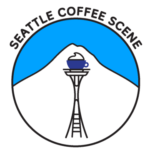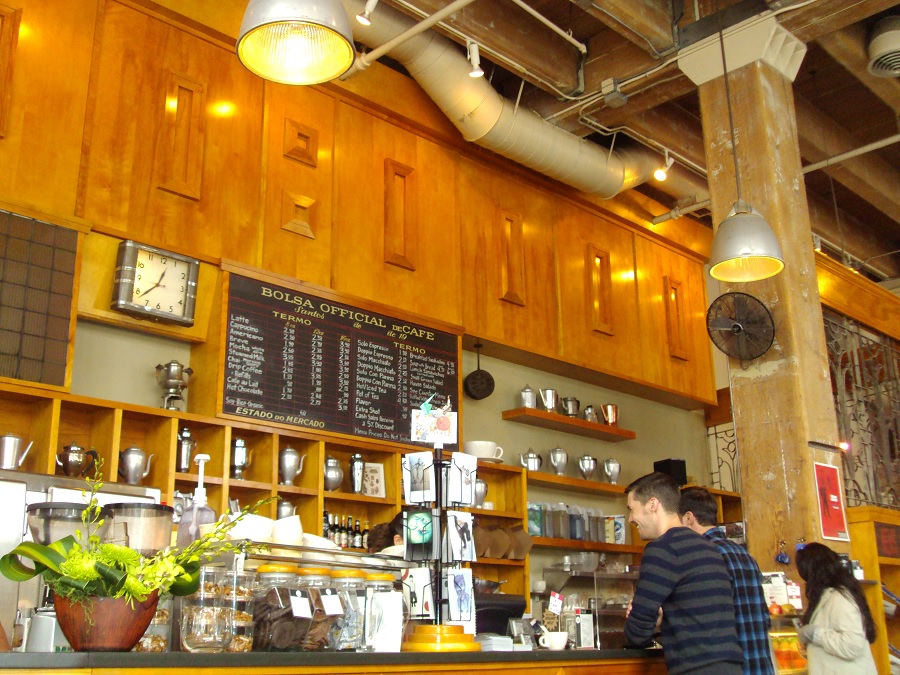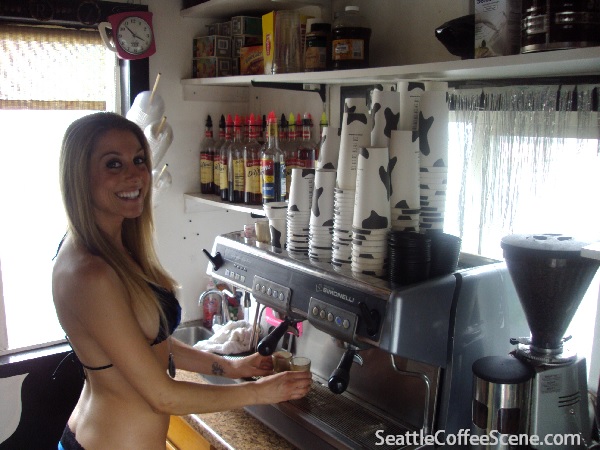Seattle Coffee Roasters Demonstrate Cooperation, Community, & Compassion
Coffee is an elixir for community building.
Here at the Seattle Coffee Scene, I have been blogging with an emphasis on “community” – whether it’s here in the University District, on Capitol Hill, or Guatemala – coffee can build bridges, tear down walls, and make best of friends out of complete strangers.
If you live in Seattle and love coffee, you’ll be happy to know that there are some people with golden hearts working hard “behind the coffee scene” in this town and doing great work on behalf of others.
In the coffee industry, while many people like the idea of creating meaningful partnerships and making choices where sustainability and mutual respect is a priority, it’s important to highlight those try to integrate their efforts in their business model.
Let’s begin with two you may already be familiar with: Caffe Ladro and Zoka Coffee Roasters & Tea Company.
Over the course of many months of brainstorming and conversations, these two Seattle-based coffee companies would join forces with a non-profit who has recently completed building a school in a community in El Salvador that is near the coffee fincas that they source their beans from.
Building A School Came First
Previously, the SQ Foundation, a non-profit aimed at helping indigenous communities, provided the funding to construct The Centro Escolar Canton Ojo de Agua, a school that serves over 70 families in an isolated region of El Salvador.
Over the last year, Caffe Ladro while sourcing their beans teamed up with Zoka Coffee in an effort to help build a soccer field near the school for local children.
Zoka Coffee and Caffe Ladro are both donating money for every bag of beans sold that originated from the nearby farm in El Salvador – the NataMaya roast.
A Seattle Coffee Commitment To A Community in El Salvador
To launch their commitment to raise approximately $4000 to complete the school soccer field, each company held a separate but similar event last week.
Café Ladro’s event was held at their Fremont location and featured live music, a photography display by Photographer Mayita Mendez (Her pictures are featured in this post), who works with the SQ Foundation and whose family owns the Finca Talnamica.
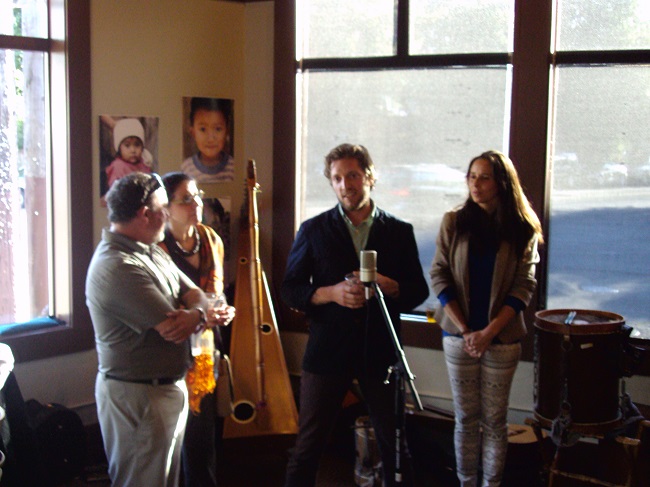
Caffe Ladro owner Jack Kelley, left. Jared Linzmeier center, along with Nena and Mayita Mendez.
“This was a special night for us at Ladro because it represents our commitment to bringing together our community in Seattle and our community of producing partners,” stated Jared Linzmeier, Caffe Ladro’s Director of Coffee
“Our sourcing model is really about finding genuine people who are motivated to produce beautiful coffees and do right by the earth and the people they employ, plus it has to taste great,” Jared added.
The open event brought many of the areas coffee professionals, baristas, friends, and members of the community to celebrate this established partnership.
“If we can help our customers understand how passionate we are about these ideas we also believe they will be better equipped to know which coffees to buy to have the biggest impact with their purchasing power,” Jared stated.
“There are some really amazing coffee producers out there and we’re thrilled to be in a position to get to know them, appreciate their coffees, and share their stories,” Jared added.
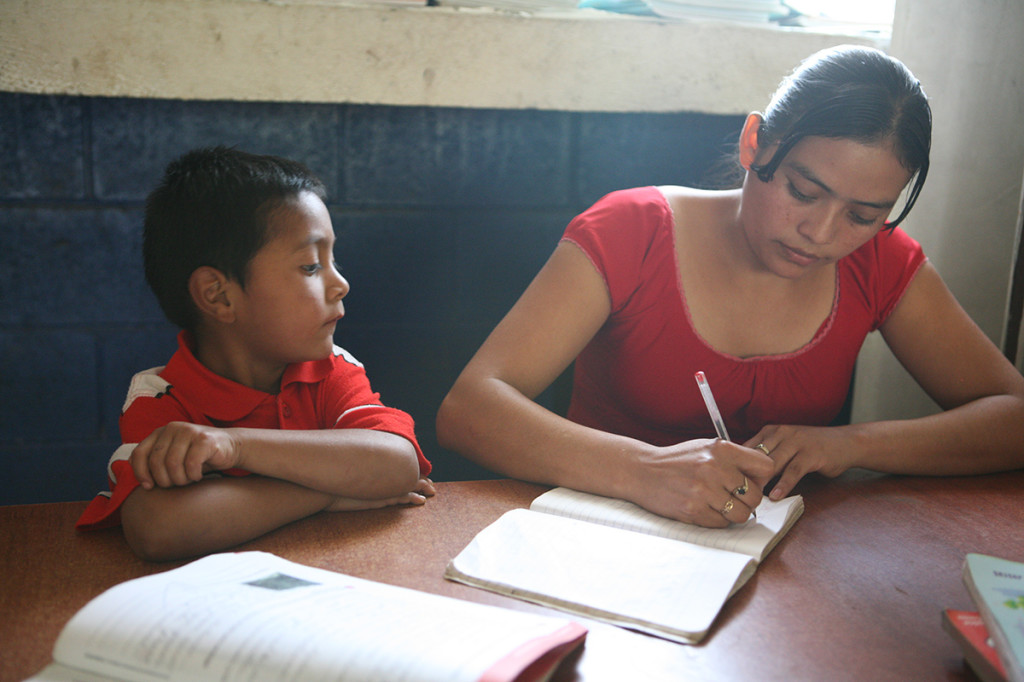
El Salvador. Photo courtesy of Mayita Mendez.
Brewing Community Partnerships Brings Hope
Zoka Coffee also held a similar open “Straight from the Source” event at their Green Lake location, which drew dozens of supporters, Zoka customers, family, and friends.
“This event connects producers with their end consumer, café customers. Straight from the Source celebrates the incredible coffees themselves, as well the hard working farmers and processors behind them,” said Dana Foster, Zoka’s Director of Coffee.
In this particular region of El Salvador – and like many other places in Central America – indigenous families find it difficult to access life’s basic necessities and medical services. However, direct trade and community partnerships with organizations generally mean higher wages, healthier communities, and a better quality of life for the farmers and their families.
“We have been collaborating with the Ortiz-Mendez Family of El Salvador for the past two years to bring in a full container of amazing coffees through our Zoka Family Direct Trade program,” Dana said.
“During this event, we also released our newest Single Origin, NataMaya. We wanted to raise awareness about this coffee and the community of Ojo de Agua, where it is grown. For every 12 oz. retail bag purchased, Zoka is donating two dollars back to the community to fund the construction of a soccer field,” Dana added.
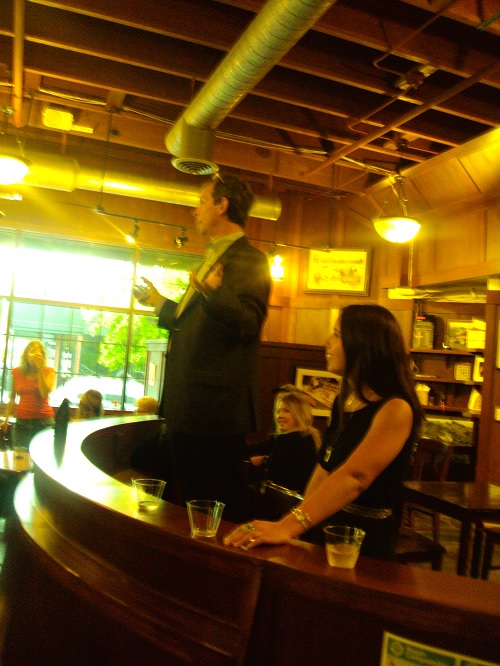
Zoka Coffee owner, Jeff Babcock and Zoka’s Director of Coffee,
Dana Foster welcoming attendees to their event.
A Commitment to Connect with People
“We are incredibly intrigued by and passionate about coffees ability to connect people around the world, while building lasting sustainable relationships with equitable benefits,” Dana said of Zoka’s partnerships.
“By connecting directly with producers at origin, we accomplish a number of goals. First, we are able to source the most unique and high-quality coffees. We are also able to ensure that we are collaborating with communities who are practicing or actively working towards ecologically sustainable cultivation methods and socially responsible practices. Finally, it gives us an opportunity to connect with the coffee community in a more meaningful and productive way,” Dana said.
As a coffee consumer, I couldn’t agree more. When I stop to actually think about this – it becomes apparent that while I continually demand high-quality coffee, want environmentally sustainable farming practices, and have fair wages and ethical treatment of growers and coffee pickers, I too have a role to play here. We probably should demand more eco-friendly coffee shops. Consumers have a role to play. For me, it just might be where I choose to spend my money. While it might not seem like a lot to do, collectively it has a tremendous impact on current and future efforts like this done by Caffe Ladro and Zoka Coffee. And that’s why I support them.
“We can collaborate with communities on projects or work with them to bring needed services while educating and exciting consumers on how they, too participate with their purchase of our coffee.” Dana Stated. “We are committed to having direct partnerships with our coffee producers because it provides maximum benefits for everyone involved in the supply chain,” Dana said.
Central to the Story is Mayita and the Family Coffee Farm
Mayita Mendez and her family are central to the story. While she works with the SQ Foundation to bring the school to the area, she has also developed a working relationships with Caffe Ladro and Zoka Coffee to facilitate the construction of the soccer field.
“Working with Ladro and Zoka has been a dream come true! Coffee has been in my family all of my life but I never felt drawn to participate. It was actually working with the community and SQ Foundation that I began to see what an amazing process coffee was,” Mayita stated.
“For me, coffee has nothing to do with coffee! Coffee is about community and connection, it brings people together from all parts of the world. You can sit and connect with someone at a cafe in NYC over a nice cup of coffee. You can go to source and connect with a coffee picker. You can walk the farm and connect with the beauty of your surroundings. You can meet awesome coffee roasters and begin a partnership that not only serves them and us, but impacts the community as well,” Mayita added.
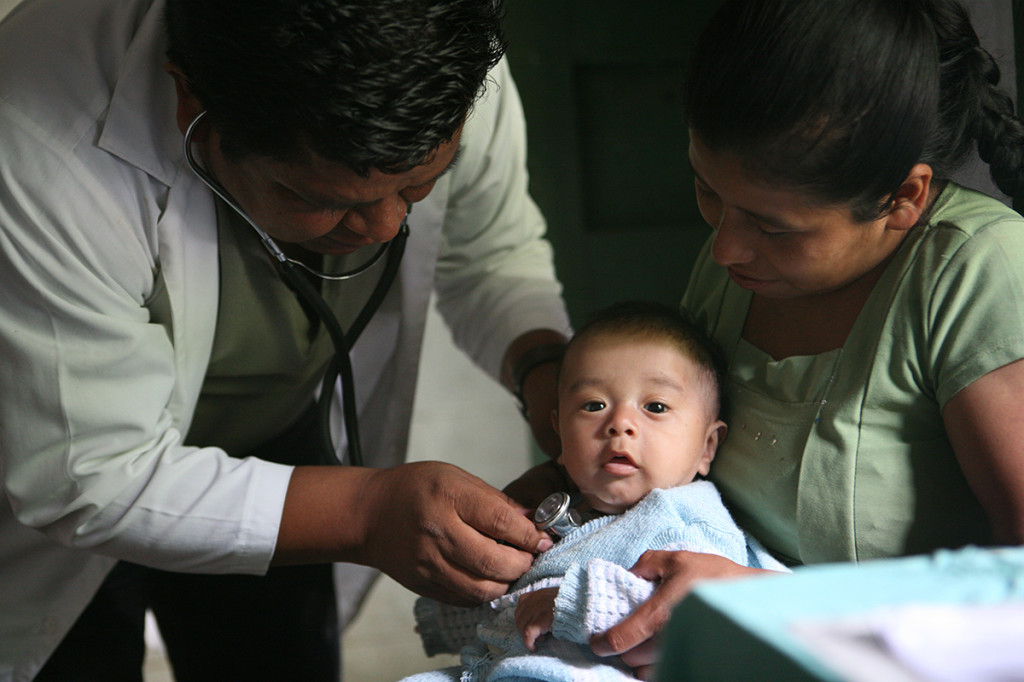
Photo courtesy of Mayita Mendez.
Partnerships created to be mutually beneficial is important and economically prudent. But when partnerships can be done to be beneficial for all parties including a community, that is an incredible business model that appears sustainable.
“That is amazing to me, to meet people who are running great businesses and that are socially conscious. It is about getting a great cup of coffee, but how much richer and more delicious is that cup when you know that it comes from working with people you respect, knowing that the community benefits, that the land is treated kindly, that the workers are looked after. That’s what our partnership with Zoka and Ladro is like, they have taught us so much,” Mayita added.
Also impressed were the owners of the coffee farm who understand the level of desperation in the entire region and have done whatever they could to help. “They (Zoka and Ladro) are sensitive good-hearted people” said Herman Mendez, co-owner of the coffee farm.
How Can You Help?
Zoka Coffee and Caffe Ladro is making it really easy to help. You can either donate directly or you can buy their coffee NataMaya that comes from the nearby farm. $2 per bag of coffee sold will be donated to build a soccer field with local labor and supplies.
